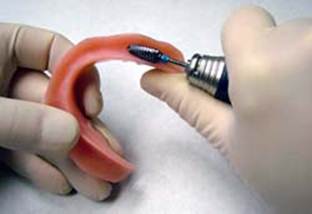- New dentures are custom-made to the shape of the mouth to assure proper fit and retention. Over time, changes in the shape of the mouth due to aging result in dentures no longer fitting comfortably.
- “Dentures that don’t fit properly are more than just uncomfortable,” explains Dr. Stephen Burton, Comprehensive Mobile Care’s Regional Dental Director and a practicing dentist in nursing facilities. “When dentures don’t fit, they cancause pain, sometimes severe, along with other health problems such as mouth sores, fungal infections and malnutrition.”
- Comprehensive Mobile Care’s affiliated dental teams reline residents’ dentures in the comfort of their facilities with state-of-the-art equipment and caring, experienced dentists and support staff. Denture relines involve shaving away the undersides of dentures and replacing them with plastic to ensure proper fitting to the gums. Routine relines will ensure that residents continue to have a comfortable and stable fit for their dentures despite the changing anatomy of the mouth.
ILL-FITTING DENTURES
Why do dentures that once fit no longer fit?
Over time, the face, jawbone and gum tissue structures change. It is not the denture that has changed, but the oral cavity. Jawbone deterioration occurs when missing teeth redirect the body to send nutrients to areas other than the jaw.
Why are ill-fitting dentures problematic?

Ill-fitting dentures and partials tend to cause discomfort and/or pain which may prevent people from wearing their dentures regularly. It is also difficult to eat when the denture is loose in the mouth. Prolonged use of
ill-fitting dentures may lead to increased bone loss.
How do you detect an ill-fitting denture?
Ill-fitting dentures will slip out of place, become more difficult to hold with suction and may even cause soreness and/or pain along the gum line.
What can be done to make dentures fit again?
In many cases, dentures can be permanently relined by a dentist to fit the changing jawbone ridge and gum tissue.
Regularly applied adhesive material: what is good or bad about it?
Some adhesives contain Zinc, which is safe to use in moderation but may contribute to harmful effects if overused. In addition, it is difficult for those with impaired dexterity to apply adhesives correctly, leading to dentures not being worn correctly and increasing the likelihood of dentures being lost.
Permanent reline: How can a reline be done at the nursing facility and why is it better than adhesive material?
The dentist who goes to a facility will have the necessary supplies and equipment to reline a denture while the patient is waiting. (Occasionally, the denture needs to be sent to a lab for processing.) Relining the ill-fitting denture will generally result in a proper fitting denture. This is generally a better alternative to having to use adhesives regularly.
